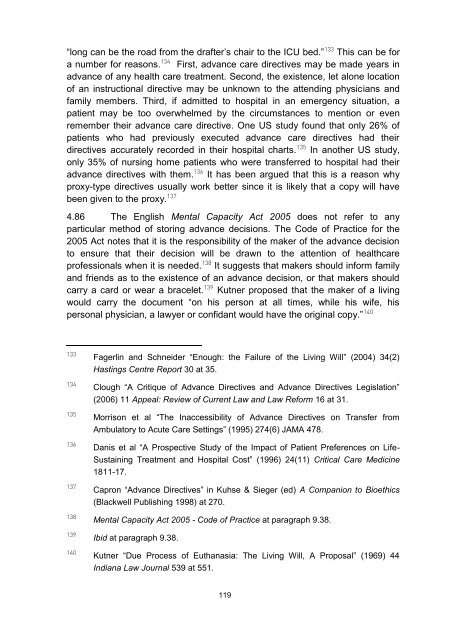Consultation Paper on Bioethics - Law Reform Commission
Consultation Paper on Bioethics - Law Reform Commission
Consultation Paper on Bioethics - Law Reform Commission
You also want an ePaper? Increase the reach of your titles
YUMPU automatically turns print PDFs into web optimized ePapers that Google loves.
“l<strong>on</strong>g can be the road from the drafter‟s chair to the ICU bed.” 133 This can be for<br />
a number for reas<strong>on</strong>s. 134 First, advance care directives may be made years in<br />
advance of any health care treatment. Sec<strong>on</strong>d, the existence, let al<strong>on</strong>e locati<strong>on</strong><br />
of an instructi<strong>on</strong>al directive may be unknown to the attending physicians and<br />
family members. Third, if admitted to hospital in an emergency situati<strong>on</strong>, a<br />
patient may be too overwhelmed by the circumstances to menti<strong>on</strong> or even<br />
remember their advance care directive. One US study found that <strong>on</strong>ly 26% of<br />
patients who had previously executed advance care directives had their<br />
directives accurately recorded in their hospital charts. 135 In another US study,<br />
<strong>on</strong>ly 35% of nursing home patients who were transferred to hospital had their<br />
advance directives with them. 136 It has been argued that this is a reas<strong>on</strong> why<br />
proxy-type directives usually work better since it is likely that a copy will have<br />
been given to the proxy. 137<br />
4.86 The English Mental Capacity Act 2005 does not refer to any<br />
particular method of storing advance decisi<strong>on</strong>s. The Code of Practice for the<br />
2005 Act notes that it is the resp<strong>on</strong>sibility of the maker of the advance decisi<strong>on</strong><br />
to ensure that their decisi<strong>on</strong> will be drawn to the attenti<strong>on</strong> of healthcare<br />
professi<strong>on</strong>als when it is needed. 138 It suggests that makers should inform family<br />
and friends as to the existence of an advance decisi<strong>on</strong>, or that makers should<br />
carry a card or wear a bracelet. 139 Kutner proposed that the maker of a living<br />
would carry the document “<strong>on</strong> his pers<strong>on</strong> at all times, while his wife, his<br />
pers<strong>on</strong>al physician, a lawyer or c<strong>on</strong>fidant would have the original copy.” 140<br />
133 Fagerlin and Schneider “Enough: the Failure of the Living Will” (2004) 34(2)<br />
Hastings Centre Report 30 at 35.<br />
134 Clough “A Critique of Advance Directives and Advance Directives Legislati<strong>on</strong>”<br />
(2006) 11 Appeal: Review of Current <strong>Law</strong> and <strong>Law</strong> <strong>Reform</strong> 16 at 31.<br />
135 Morris<strong>on</strong> et al “The Inaccessibility of Advance Directives <strong>on</strong> Transfer from<br />
Ambulatory to Acute Care Settings” (1995) 274(6) JAMA 478.<br />
136 Danis et al “A Prospective Study of the Impact of Patient Preferences <strong>on</strong> Life-<br />
Sustaining Treatment and Hospital Cost” (1996) 24(11) Critical Care Medicine<br />
1811-17.<br />
137 Capr<strong>on</strong> “Advance Directives” in Kuhse & Sieger (ed) A Compani<strong>on</strong> to <strong>Bioethics</strong><br />
(Blackwell Publishing 1998) at 270.<br />
138 Mental Capacity Act 2005 - Code of Practice at paragraph 9.38.<br />
139 Ibid at paragraph 9.38.<br />
140 Kutner “Due Process of Euthanasia: The Living Will, A Proposal” (1969) 44<br />
Indiana <strong>Law</strong> Journal 539 at 551.<br />
119

















